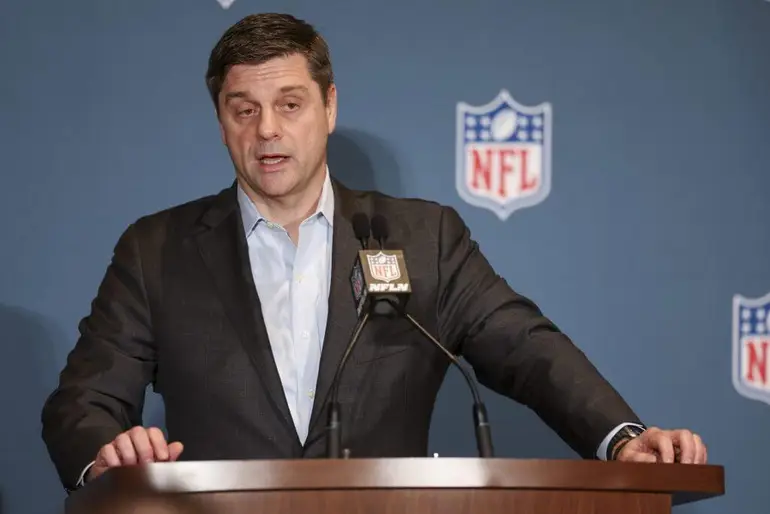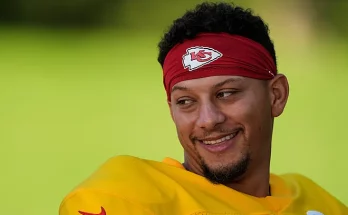In a move that has sent ripples through both the NFL and the professional golf world, longtime league executive Brian Rolapp is officially stepping away from football to become the next CEO of the PGA Tour. The decision marks a seismic shift in leadership for two of the most powerful sports organizations in North America, and industry insiders are already weighing in on the broader implications this will have on the direction of both leagues. Rolapp’s departure is a surprise to some, but those close to the situation say the move has been quietly taking shape for months.
Rolapp has served as the NFL’s Chief Media and Business Officer and has been a central figure in shaping the league’s billion-dollar media strategy for over a decade. He’s been behind key broadcasting negotiations, digital expansion, and strategic partnerships that have helped transform the NFL into an omnipresent, year-round behemoth. His fingerprints are all over landmark deals with Amazon Prime, YouTube TV, ESPN, CBS, NBC, and Fox. As streaming platforms rose to prominence and consumer habits shifted, it was Rolapp’s vision that kept the NFL not only relevant, but ahead of the curve. Now, he’s taking that business savvy to golf, a sport with a proud tradition but one that’s also facing an identity crisis in the wake of fractured loyalties, declining TV ratings, and the ongoing LIV Golf controversy.
The PGA Tour’s decision to bring Rolapp aboard signals a bold intent to revamp its commercial structure and media reach. With questions still lingering about the Tour’s potential merger with LIV Golf, and player trust at a tipping point, the incoming CEO will have to stabilize a tumultuous landscape. Sources say Rolapp was intrigued by the challenge, viewing it as an opportunity to revitalize a sport he’s passionate about while applying the aggressive business acumen that made him a pillar within the NFL’s upper management. With the future of the PGA Tour hanging in the balance, his hiring could prove to be one of the most consequential executive moves in modern sports.
For the NFL, Rolapp’s departure is significant. Commissioner Roger Goodell has long considered him one of his most trusted lieutenants, someone who understood both the traditions of the league and the fast-paced evolution of media technology. Rolapp was often mentioned as a potential successor to Goodell himself, and while he never publicly campaigned for the job, many in league circles viewed him as a logical heir apparent. Now that path is closed. The NFL will need to regroup quickly and find someone capable of sustaining the massive momentum Rolapp helped create.
Internally, the NFL is treating the exit as a bittersweet moment—proud of Rolapp’s accomplishments, but also aware of the void he leaves behind. Executives across the league have already begun speculating who might rise to fill his shoes. Several names have emerged, including Hans Schroeder, who worked closely with Rolapp on NFL Media strategy, and Tracie Rodburg, a key figure in sponsorships and corporate partnerships. But replacing Rolapp will not be easy. His tenure was marked by stability, forward-thinking innovation, and a remarkable ability to bridge the old and the new. From launching NFL+ to rethinking Sunday Ticket and integrating artificial intelligence into data operations, Rolapp pushed the league’s infrastructure into the future.
In a statement, Rolapp expressed gratitude for his time with the NFL and said he was “honored” to lead the PGA Tour into its next chapter. “The NFL has been an incredible part of my professional life. I’ve had the privilege of working alongside some of the brightest minds in sports, and I’ll always be grateful for that experience,” he said. “Now, I’m thrilled to take on this new challenge with the PGA Tour. Golf is at a pivotal moment, and I believe the opportunity for growth—both globally and digitally—is immense. I look forward to working with players, sponsors, and fans to shape the future of this great sport.”
Rolapp’s transition is expected to take place over the next several weeks, with formal introductions to key PGA Tour stakeholders already underway. Tour officials have lauded the hire, calling Rolapp a “visionary” who understands how to grow sports in the modern age. In particular, they are eager to see how he navigates the complex relationship with LIV Golf and how he proposes to reconcile the divide that has left some of the game’s biggest stars on opposite sides of a bitter professional schism.
The decision to hire an outsider—and from a different sport, no less—reflects the PGA Tour’s sense of urgency. While golf remains a lucrative and popular sport, it has struggled to capture younger audiences and expand beyond its traditional base. With international competition rising and the LIV Golf dynamic reshaping player priorities, the Tour realized it needed someone not just steeped in golf tradition but battle-tested in sports business transformation. Rolapp fits that bill.
His role at the NFL required him to not only think about media distribution and advertising, but also to anticipate how fans consume sports in a digital-first, mobile-driven world. Whether it was launching the NFL’s official streaming service, pushing for expanded global broadcasting rights, or negotiating contracts that blended live TV with on-demand flexibility, Rolapp has always had his eyes on the future. The PGA Tour will look to him to bring that same foresight and execution to their product.
For the players, Rolapp’s appointment will be watched closely. Many Tour players have grown increasingly vocal about their desire for greater transparency and shared decision-making. The sudden announcement last year of a potential framework deal with the Saudi Public Investment Fund (PIF)—without prior consultation with top players—left a bitter taste. Rolapp, known for his diplomatic yet decisive style, will need to rebuild that trust. Players want to feel included, heard, and respected. Rolapp’s ability to unify and communicate will be tested early.
At the same time, the media side of golf is poised for disruption. With cord-cutting accelerating and more fans seeking flexible viewing options, the Tour’s broadcast partners will need to innovate. Rolapp’s relationships across the media landscape—Netflix, Amazon, YouTube, NBCUniversal—will be invaluable as golf attempts to reinvent its distribution model. A sport once rooted in tradition may soon be reshaped by the same kind of media revolution that Rolapp engineered in the NFL.
Financially, the PGA Tour is at a crossroads. Between the competing interests of legacy sponsors, new market entrants, and international investors, Rolapp will need to balance aggressive growth with careful stewardship. It’s a complex equation: expand without alienating loyalists, modernize without compromising values, and capitalize on new revenue streams without losing sight of what makes golf special.
Reaction across the sports landscape has been swift. Former colleagues, executives, and players have praised the move. “Brian’s one of the smartest people I’ve ever worked with,” one senior NFL executive said. “He sees where the ball is going before anyone else. If anyone can help the PGA Tour navigate this moment, it’s him.” Others echoed that sentiment, noting Rolapp’s rare combination of business intelligence and emotional intelligence. He knows how to work a boardroom, but he also knows how to listen—something the PGA Tour desperately needs right now.
Even outside the NFL, leaders across the NBA, MLB, and media conglomerates have taken note. The hiring reflects a broader trend of sports organizations seeking cross-disciplinary talent. Gone are the days when a league hired only from within its own ecosystem. Rolapp’s leap from football to golf shows that the sports business world is increasingly interconnected, and that success in one arena can translate into leadership in another.
As the PGA Tour enters this new era, expectations will be high. Rolapp isn’t just being brought in to manage the day-to-day. He’s being brought in to reimagine the Tour’s identity, redefine its global relevance, and recalibrate its place in a crowded, competitive entertainment landscape. His legacy at the NFL was one of calculated risk-taking that often paid off. Whether that same blueprint will work in the more tradition-bound world of golf remains to be seen. But one thing is certain: Brian Rolapp’s arrival signals that the PGA Tour is ready to think—and act—differently. And for a sport facing one of the most pivotal periods in its modern history, that might be exactly what it needs.



